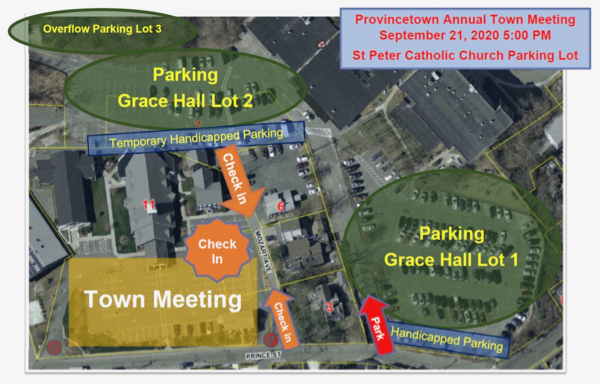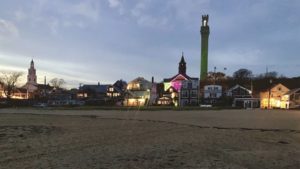PROVINCETOWN — Like much of the summer season this year, town meeting in Provincetown is going to arrive later, leaner, and al fresco. Originally scheduled for early April, at the height of the pandemic, it was moved to Monday, Sept. 21, at 5 p.m. and outdoors, to the St. Peter the Apostle Catholic Church parking lot at 11 Prince St. The warrant has been trimmed and adjusted to not be overlong. Even so, voters will be asked to consider some noteworthy articles.

Harbor Hill
If past is prologue, then the longest discussion will likely be about Article 11, which allocates $595,000 from the general fund for a year’s worth of bond payments for the Harbor Hill market-rate rental housing project.
In advance of the originally scheduled April town meeting, then-Town Manager Robin Craver argued that the general fund, and not short-term rental tax or marijuana tax receipts, was the right source of money for the bond payments.
“When people talk about the debt service like it’s a subsidy or an addition, they’re counting it twice,” said Craver. The $10.7 million that the town voted in 2017 was a debt authorization, not an expenditure of cash, said Craver. “That $595,000 is your mortgage payment. It’s not like you’re throwing $595,000 to the wind. You’re investing in a property, and at any point you’ll be able to sell it.”
There are 28 apartments at Harbor Hill; 25 are currently rented. The Year-Round Market Rate Rental Housing Trust hired two outside experts this year, one to do a capital needs assessment on the buildings, and one to do a financial viability analysis on the project overall.
The capital needs assessment identified $1.7 million worth of work that is needed over the next 20 years, about 50 percent of it in the next five years, according to the report. The financial viability analysis is just getting underway. It is supposed to assess management costs, maintenance costs, and the potential for other sources of public or private money.
“We have a broader set of housing needs than just Harbor Hill,” said select board member Louise Venden. “We need to not just think that as long as we can fund Harbor Hill, everything will be OK. If you look at the range of people whose housing needs are not being met — we need to be more careful about how we spend the town’s money.”
Ryder Street Dune
Article 8 is a step toward the construction of a man-made dune designed to stop seawater from flooding the center of town via Gosnold Street. In January 2018, a nor’easter pushed a swell of seawater into Provincetown Harbor that, at high tide, flowed over the beach and into downtown. Numerous homes and businesses suffered damage, especially along Bradford Street near town hall.

Conservation Agent Tim Famulare expects the Ryder Street dune project to be mostly funded by state and federal grant money, but that process, while cheaper, can be extremely complex.
Article 8 authorizes the town to acquire access rights across the beach-facing end of several properties, because the town’s permanent right to access and maintain the dune is a prerequisite for the grants. The article directs the select board to negotiate for the access privileges (or easements) with the landowners and to take them by eminent domain if necessary.
If eminent domain were used, an assessor or a court would decide the fair compensation to be paid to the land owners. The flood-protection value of the dune could be balanced against any harm to the land owners’ other interests, however. The assessor was still developing formal cost estimates at press time, but they should be available later this week, said Famulare.
Senior Housing at Maushope
Buried within Article 9 is funding to acquire land for supportive senior housing. The Provincetown Housing Authority (PHA) runs the Maushope building off Harry Kemp Way, which includes 24 state-subsidized apartments for seniors and people with disabilities. Article 9 includes a grant of $425,000 from community preservation funds for an adjacent parcel of land, where the PHA hopes to build 10 to 15 new units.
“Supportive housing means there’s laundry services, cleaning services — maybe there’s a common kitchen and somebody comes and cooks dinner,” said Kristin Hatch, director of the PHA. “It’s people who aren’t so sick they need a nursing home, maybe aren’t rich enough for assisted living. It’s been shown there’s better health outcomes when there are more people around, checking in.
“We see the need here for affordable housing for seniors,” continued Hatch. “We’re a small, state-chartered agency, but there’s a lot of state-level expertise we can draw on to put this project together and find the funding streams.” Affordable housing typically involves combining state and federal grant money, tax credits, financing, and rental revenue streams, which collectively cover the cost of the project. Getting the right parcel at the right price is the first hurdle.
“It’s all theoretical until you actually have the land to develop,” said Hatch.
Indigenous Monuments Expert
Plans for a memorial to the Wampanoag people bogged down in 2019, and select board member Lise King advocated for the town to contract with a specialist in indigenous representation and public art. Article 13 allocates $12,600 for that purpose. The specialist would evaluate possible locations, artists, and budgets, and report back with at least one public art proposal for the town to consider.
